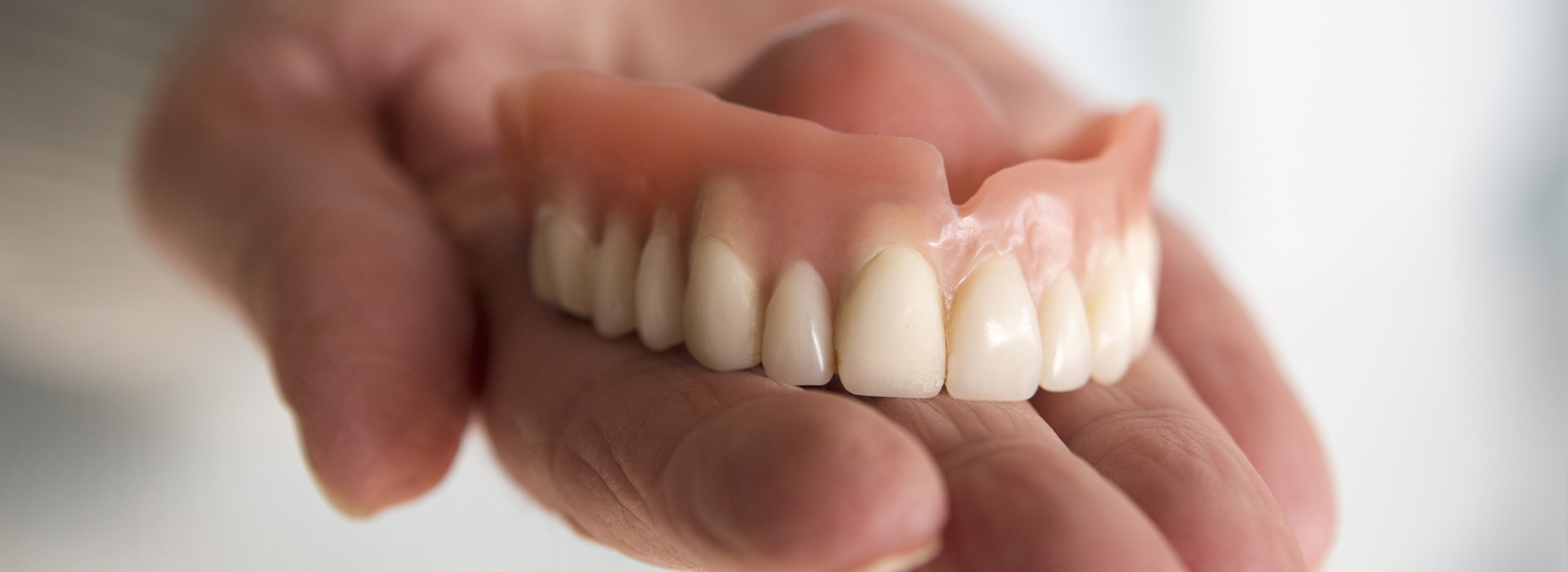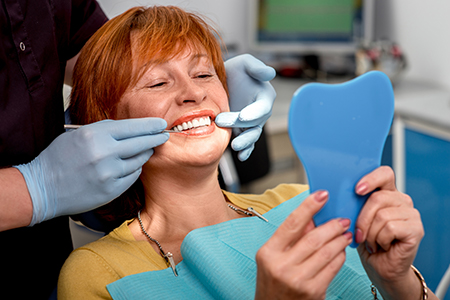Existing Patients
(740) 344-4549
New Patients
(740) 212-1897

Advances in dental materials and digital techniques have made replacing missing teeth more predictable and natural-looking than ever. While fixed options like dental implants and bridgework are excellent for many patients, removable dentures remain a reliable choice for restoring a confident smile when appropriate.
At the office of Brian Howe DDS, Family Dentistry, we build dentures using durable materials and careful craftsmanship to create appliances that fit comfortably and look lifelike. Our approach balances function and aesthetics so patients can speak, eat, and smile with confidence.
We believe every treatment plan should reflect the person wearing it. That means we listen closely to your goals, assess the health of your mouth, and recommend denture solutions that suit your lifestyle and long-term oral needs.
Losing a tooth may feel like a purely cosmetic problem at first, but the effects are often broader. Gaps in the mouth can alter how you chew and speak, and over time they may cause adjacent teeth to shift. These changes can lead to bite problems, increased wear, and difficulties eating certain foods.
Beyond function, missing teeth influence facial support. Without the natural structure provided by teeth, the lips and cheeks can appear sunken, which subtly changes facial appearance. Replacing lost teeth helps restore proper support and can improve the overall balance of the face.
There are also oral-health considerations. Areas where teeth are missing can be harder to clean well, and remaining teeth may be subject to added stress. Addressing missing teeth sooner rather than later reduces the risk of further complications and keeps your mouth healthier over the long term.
Dentures are removable prosthetic appliances made of artificial teeth set into a base that rests on the gums. They come in many designs and materials, but the goal is the same: to restore the appearance and function of natural teeth while supporting the surrounding tissues.
Because dentures are removable, they allow caretaking of both the appliance and the mouth beneath it. This can be an advantage for hygiene and soft-tissue health, as patients can clean the denture outside the mouth and the gums and remaining teeth inside the mouth can be brushed and inspected more easily.
Modern denture teeth are crafted to mimic natural tooth color and translucency, and advances in denture-base materials make appliances more comfortable and lifelike than older models. With proper fit and care, dentures can provide years of functional use and a pleasing aesthetic outcome.
Selecting the most suitable denture depends on how many teeth are missing, the condition of the remaining teeth and gums, and your personal preferences for maintenance and stability. Our team evaluates your mouth comprehensively to recommend whether a full denture, partial denture, or an implant-assisted option is best.
Full dentures replace all teeth in the upper or lower arch when no healthy teeth remain. They rely on tissue contours and, when appropriate, suction or adhesives to stay in place. A conventional full denture is made after tissues have healed from extractions; an immediate denture is fabricated in advance so you are not without teeth while healing occurs.
Partial dentures are used when some healthy teeth remain. They fill gaps and also help prevent neighboring teeth from drifting into open spaces. Partial designs can use clasps, precision attachments, or flexible frameworks depending on the clinical needs and esthetic goals.
For patients seeking extra retention, dentures can be combined with dental implants. Overdentures or implant-supported dentures attach to implants to improve stability and reduce movement, providing a hybrid solution that often feels more secure during speech and chewing.
Complete dentures are tailored to the contours of your mouth. A conventional complete denture is made after healing is finished following extractions, offering a stable fit once tissues have settled. Immediate dentures are placed at the time teeth are removed so you leave the appointment with a complete smile, though they often require adjustments as healing progresses.
Partial denture frameworks can be crafted from metal alloys, flexible resins, or combination materials. Each option has advantages: metal frameworks tend to be thinner and durable, while flexible materials may offer improved comfort and a less obtrusive fit for some patients. Your dentist will recommend a design that balances strength, fit, and esthetics.
Immediate denture
Immediate dentures allow patients to leave the clinic with teeth in place after extractions. Because the mouth changes as it heals, these dentures frequently require relines or adjustments to maintain a comfortable fit.
Overdenture
An overdenture gains added stability by fitting over retained tooth roots or specialized attachments. Preserving selected roots under an overdenture can help maintain bone and improve sensory feedback during chewing.
Implant-supported denture
By anchoring a denture to strategically placed implants, this option provides notable improvements in retention and chewing efficiency compared with traditional tissue-supported dentures.
Creating a comfortable, functional denture is a multi-step process that combines clinical assessment with careful laboratory work. We begin with a thorough medical and dental history, followed by an oral exam and any necessary imaging to understand bone contours and tissue health.
Impressions are taken to capture the fine details of the mouth, and these records guide the laboratory in fabricating a framework and trial prosthesis. During try-in appointments, tooth shape, size, and position are refined so that the final denture complements your facial features and bite.
Once the denture is seated, we check how it functions during speech and chewing and make adjustments to eliminate pressure spots. Fitting a new denture is iterative by design — the goal is a prosthesis that is comfortable, stable, and aligned with your expectations for appearance and function.
Because tissues naturally change over time, a follow-up plan is important. Routine exams let us monitor oral health, check the fit of the denture, and perform relines or repairs as needed to maintain optimal performance.

Adjusting to a new denture is a process most patients can navigate successfully with realistic expectations and a few practical strategies. In the first days and weeks you may notice increased saliva, minor speech changes, and sensitivity in places where the denture contacts soft tissue — these are common and typically improve as the mouth adapts.
Speaking out loud, reading passages, and practicing pronunciation can speed up your ability to speak naturally with the prosthesis. When eating, begin with softer foods and cut items into smaller pieces; as your comfort and chewing strength improve, you can gradually return to a wider variety of textures.
Maintaining hygiene is essential. Rinse and brush your denture daily and clean your gums and any remaining teeth to promote tissue health. Remove the appliance at night to give your mouth a rest and to reduce the risk of irritation or infection.
Over time, fit changes may occur as jawbone and soft tissues remodel. We provide relines, adjustments, and repair services to keep your denture functioning well. If you ever experience persistent soreness or a sudden change in fit, schedule an evaluation so we can address the issue promptly.

Denture success relies on a team approach: your prosthesis depends on careful design and ongoing follow-up. Regular dental visits let us examine the condition of the appliance, evaluate oral tissues, and identify any early changes that could affect fit or function.
We emphasize clear communication so your denture continues to meet your needs as your mouth and lifestyle change. Whether it’s a maintenance reline, a repair, or a discussion about transitioning to an implant-assisted solution, we’ll present the clinically appropriate options and support you in choosing what feels right.
Our commitment is to provide practical, compassionate care that helps you maintain comfort, oral health, and confidence in your smile for years to come. If you have questions about which denture option is best, or how to care for an existing appliance, our team is ready to help.

Dentures are a time-tested solution for restoring function and appearance when teeth are missing. With modern materials and careful clinical technique, they provide a comfortable, esthetic option that supports everyday activities like eating and speaking.
At our office, we take a personalized approach to denture care — assessing your oral health, discussing appropriate alternatives, and guiding you through fabrication and follow-up so your prosthesis performs well over time.
If you’d like to learn more about denture options or schedule a consultation, please contact us for additional information. We’re here to answer your questions and help you find a solution that fits your needs.
Dentures are removable prosthetic devices that replace missing teeth and surrounding oral tissues. They consist of artificial teeth attached to a supportive base that rests against the gums and, when properly fitted, restores basic chewing and speech function. Modern denture materials and fabrication techniques aim to reproduce the color, shape, and translucency of natural teeth for an improved aesthetic result.
Because dentures are removable, they allow direct cleaning of both the appliance and the soft tissues beneath it, which can support oral hygiene and tissue health. Proper fit depends on accurate impressions, careful laboratory work, and clinical adjustments to minimize pressure points and movement. With routine care and periodic maintenance, dentures can return important function and facial support when teeth are missing.
Good candidates for dentures include people who have lost several or all natural teeth and who seek a removable option to restore appearance and function. A comprehensive dental exam evaluates oral health, gum condition, jawbone contours, and remaining teeth to determine whether a full or partial denture is most appropriate. Medical history and lifestyle factors are also considered to ensure the chosen solution is safe and practical for the individual.
In some cases, patients may be advised to pursue implant-assisted options when additional retention or chewing efficiency is desired and when bone support permits. For those who prefer removable prostheses or for whom fixed restorations are not clinically indicated, well-designed dentures remain a reliable restorative choice. Your dentist will review the clinical findings and discuss suitable alternatives so you can make an informed decision.
Denture options include full (complete) dentures that replace an entire arch, partial dentures that fill gaps when some natural teeth remain, and immediate dentures that are placed at the time of extractions so the patient is not without teeth during healing. There are also overdentures that fit over retained roots or attachments to preserve bone and improve sensory feedback, and implant-supported dentures that anchor to dental implants for increased stability. Each design has distinct advantages depending on oral conditions and patient preferences.
At the office of Brian Howe DDS, Family Dentistry we evaluate the mouth carefully to recommend the most appropriate denture style, balancing factors such as retention, esthetics, ease of maintenance, and long-term oral health. The selection process considers whether a conventional denture made after healing, an immediate prosthesis, or an implant-assisted solution best meets the patient’s needs. Your dentist will explain how each option functions and what to expect during the fitting and follow-up phases.
The denture process begins with a thorough medical and dental history, a clinical exam, and imaging as needed to document bone and tissue contours. Precise impressions capture the mouth’s fine details so the laboratory can fabricate models, frameworks, and trial prostheses that are evaluated clinically during try-in appointments. Tooth position, bite relationships, size, and shade are adjusted at the try-in stage to create a final prosthesis that complements facial features and occlusion.
Once the denture is delivered, the dentist checks fit, speech, and chewing and makes any necessary adjustments to relieve pressure spots and improve stability. Follow-up visits are common as tissues heal or adapt, and relines or minor corrections ensure the appliance remains comfortable and functional. Because oral tissues change naturally over time, periodic maintenance is an expected part of long-term denture care.
Daily denture care starts with gentle brushing of the appliance using a soft brush and a nonabrasive cleanser to remove food particles and plaque. Rinse the denture after meals and handle it over a sink filled with water or a soft towel to prevent breakage if dropped. It is also important to clean the gums, tongue, and any remaining teeth with a soft toothbrush to support healthy oral tissues and reduce bacterial buildup.
Remove dentures at night to allow the gums to rest and to reduce the risk of tissue irritation or changes in oral flora. Store the appliance in water or a manufacturer-recommended soaking solution when not worn to prevent warping, but follow product guidelines to avoid damaging acrylic or attachments. Regular home care combined with routine dental evaluations helps preserve both the prosthesis and the underlying oral health.
During the first days and weeks with a new denture, it is common to experience increased saliva, minor speaking changes, and areas of sensitivity where the appliance contacts soft tissues. These sensations usually diminish as the mouth adapts and muscle control improves, and practicing speech and gradual dietary progression can accelerate comfort. Soft-tissue soreness may occur at pressure points and should be reported so adjustments can be made to improve fit.
Eating with a new denture is best approached by starting with softer foods cut into small pieces and chewing slowly on both sides to maintain balance. Over time you can reintroduce firmer textures as your chewing efficiency improves and your confidence grows. Prompt follow-up for persistent soreness, looseness, or difficulty speaking will allow the dental team to refine the fit and function of the prosthesis.
The useful life of a denture varies with factors such as material, oral hygiene, frequency of wear, and changes in the jawbone and soft tissues over time. As bone and tissue contours remodel, the fit of a denture can loosen, leading to reduced retention, altered bite relationships, and areas of irritation. Dentures that no longer fit well should be evaluated because poor fit can affect chewing, speech, and oral health.
Relines can restore intimate contact between the denture base and the gums when minor changes occur, while more extensive adjustments or replacement may be recommended when wear, fracture, or significant dimensional changes are present. Regular dental checkups allow detection of these changes early so appropriate maintenance—such as relining, repairs, or fabrication of a new prosthesis—can be planned to maintain comfort and function.
Yes, dentures can be used with dental implants to create overdentures or fully implant-supported prostheses that provide improved stability and chewing performance. Implant attachments reduce movement, enhance patient comfort, and often expand the range of foods that can be eaten with confidence compared with tissue-supported dentures. Implant-assisted options can also help preserve jawbone by transmitting functional forces to the bone instead of relying solely on soft-tissue support.
The choice of implant-supported designs depends on factors such as bone volume, overall oral health, and the patient’s goals for retention and hygiene. Implant-assisted dentures still require careful oral hygiene and professional follow-up to maintain implant health and prosthesis integrity. Your dentist will review candidacy, procedural steps, and long-term care needs when implant solutions are being considered.
Routine follow-up for denture wearers typically includes periodic dental exams to assess oral tissues, check for pressure areas, evaluate the fit of the prosthesis, and screen for oral conditions such as mucosal irritation or lesions. During these visits the dental team may perform adjustments, relines, or repairs as needed to maintain comfort and function. Monitoring remaining teeth and the periodontal condition is also important for partial denture wearers to preserve natural dentition.
Maintaining a schedule of regular checkups ensures early detection of changes that could compromise denture performance or oral health, and it provides an opportunity to review cleaning techniques and storage recommendations. Timely attention to repairs and relines often prevents more significant problems and helps extend the practical life of the prosthesis. Communication between the patient and clinician about fit and daily function is a key component of successful long-term maintenance.
If you experience persistent soreness, new looseness, or any damage such as a fracture or a broken tooth on the prosthesis, contact your dental provider promptly for an evaluation. Continued use of an ill-fitting or damaged denture can cause additional tissue irritation, ulcers, or functional difficulties, so professional assessment and timely adjustments or repairs are important. Do not attempt to adjust or glue a denture at home, as improper repairs can worsen the condition or harm oral tissues.
If immediate replacement is needed for comfort or function, your dentist can discuss interim options and plan definitive repairs or a new prosthesis based on the clinical findings. The office of Brian Howe DDS, Family Dentistry provides follow-up care to evaluate fit, perform relines, and coordinate repairs so your denture remains safe and effective. Regular communication about any changes in fit or comfort helps preserve oral health and prosthesis performance over time.
Our friendly and knowledgeable team is always ready to assist you. You can reach us by phone at (740) 344-4549 or by using the convenient contact form below. If you submit the form, a member of our staff will respond within 24–48 hours.
Please do not use this form for emergencies or for appointment-related matters.
